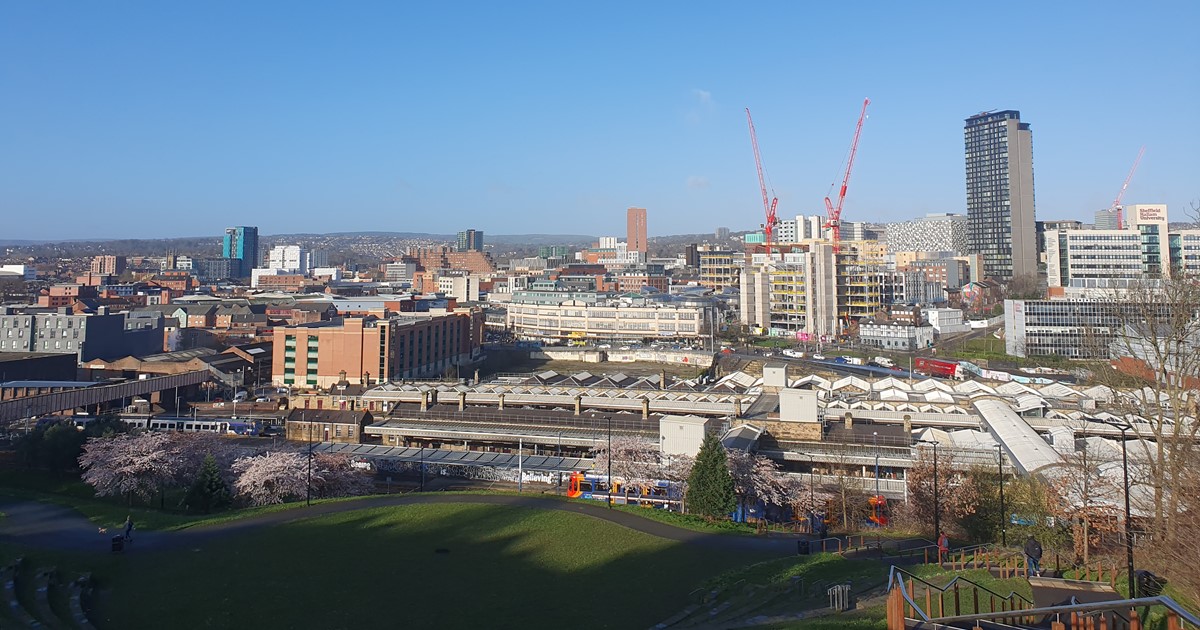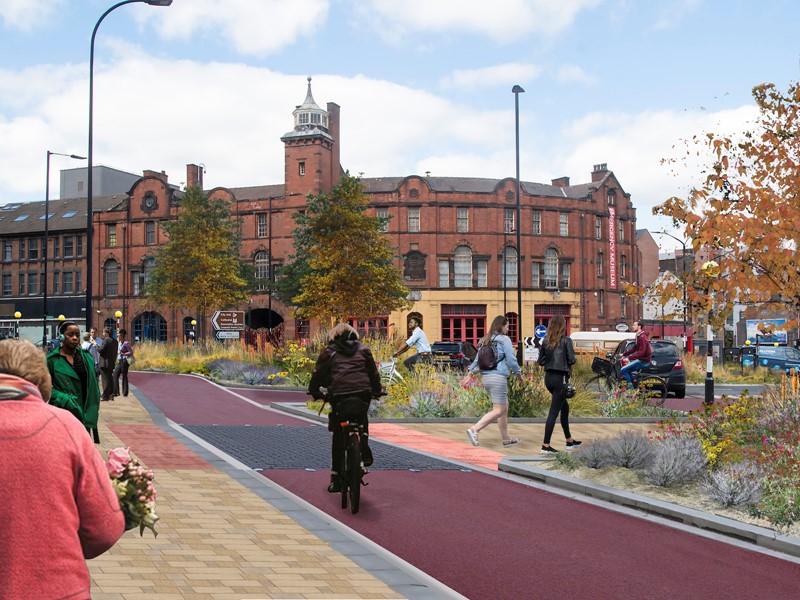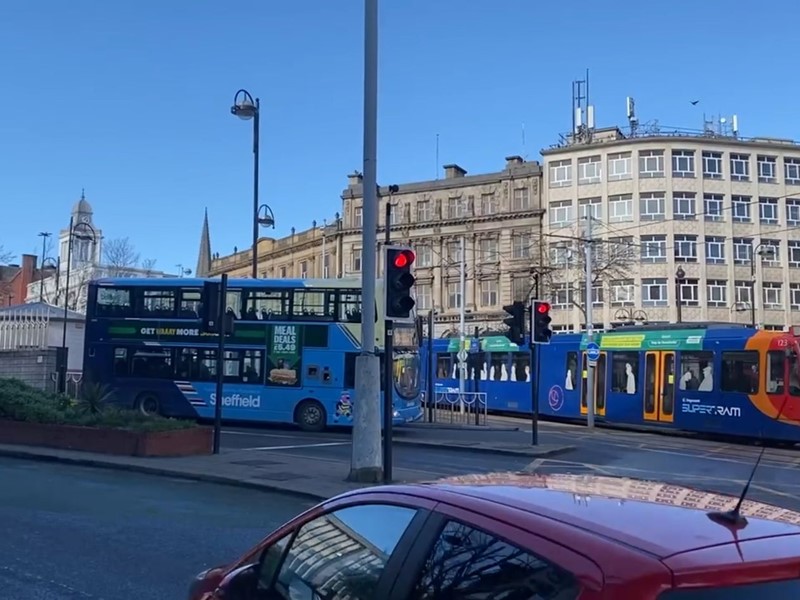Pedestrians, cyclists and motorists will soon be able to get their first experience of Sheffield’s first-ever Dutch-style roundabout as the project nears completion. Located at West Bar, in front of the Emergency Services Museum, the roundabout will give priority to pedestrians and cyclists, making it safer and easier for people to get around the city in an active way.
New ‘Routemaps’ outline Council’s plans to achieve net zero by 2030

The first tranche in a series of Routemaps outlining Sheffield City Council’s plans to lead by example and become net zero by 2030 were agreed last week at the Transport and Regeneration and Climate Policy Committee.
The Council declared a climate emergency in 2019 and, in response launched its 10 Point Plan for Climate Action to set out how it planned to decarbonise the city. The first tranche of ‘Routemaps’ follow this and outline the Council’s objectives to decarbonise the way it works, alongside wider plans to decarbonise how Sheffielders travel within the city.
We are already feeling the effects of climate change, and impacts are increasing, affecting the lives of all who live, work and study in Sheffield, and our businesses. Impacts will include:
- More extreme weather events.
- Hotter, often drier summers which can affect quality and quantity of food and water supply, and damage buildings and infrastructure.
- A negative impact on the plants and wildlife we know and love.
- Increased energy demand and reducing fossil fuels is likely to lead to further price increases and power cuts.
Routemap 1 - Our Council
Our emissions contribution through the Council’s estate and operations account for approximately seven per cent of the Sheffield’s emissions. Of this:
- The Council’s housing stock makes up 89 per cent of its emissions.
- The Council’s operational non-domestic estate contributes to five per cent of its emissions.
- Streetlighting and vehicle fleet each make up three per cent of the Council’s emissions.
To reduce its emissions by 95 per cent, to lead by example as a net zero organisation by 2030, the ‘Our Council’ objective to decarbonise, includes plans to:
- Replace the Council’s vehicle fleet with cleaner vehicles and reduce vehicle mileage - work is already underway, with 99.4 per cent of the Council’s vehicle fleet compliant with the Clean Air Zone and plans to reach 100 per cent compliance by December 2023. So far, 65 vehicles within the fleet are full electric, five are hydrogen and 21 are hybrid.
- Explore further potential to reduce energy consumption for street lighting -reducing lighting levels and hours of operation where safe and appropriate to do so and maximise the use of our lighting infrastructure, including using street lighting columns for EV charging.
- Return 30 per cent of Council-owned land to nature by 2030 - work to maximise ecosystem services on our land and create a habitat that is optimum for carbon sequestration and nature recovery.
- Provide training for Council employees and Councillors -, to ensure everyone is carbon literate and fully engaged on the journey to net zero.
- Deliver a new Housing Strategy - to include decarbonisation objectives in its key policies and action plans.
Use the Local Renewable Energy Fund to fund decarbonisation schemes locally
- The Moving On scheme, a small supported housing scheme, is already underway – this will be the first Sheffield Council homes to achieve net zero carbon in operation.
- Through the fund, 13 operational buildings have already had energy audits carried out to assess their potential for renewable energy projects; 10 have had desktop assessments and three have had full decarbonisation plans produced. A total of 26 buildings are in pipeline to benefit from the Local Renewable Energy Fund.
- The fund has been used to undertake feasibility studies for the expansion of the two district heat networks in Sheffield.
Routemap 2 - The Way We Travel
Decarbonising the way we travel will be crucial to achieving net zero in Sheffield, and healthier lives for local people, now and in years to come.
The way we travel does not just contribute to our carbon emissions, it affects our lives and wellbeing in other ways, air pollution contributes to 1 in 20 deaths in Sheffield each year and causes life-threatening illnesses.
In 2017, emissions from the transport sector contributed 642ktCO2e to our city’s emissions – 26 per cent. That is the same as 183,426 return flights from Hong Kong, 1,070 SpaceX Falcon flights to the International Space Station, or driving 1,422,234 lengths of the UK.
- Almost two-thirds of these emissions are from cars and over a quarter from light and heavy goods vehicles.
- Around 98 per cent of the vehicles in the city are either diesel or petrol - only 2 per cent of our city’s vehicles are electric.
- 60 per cent of journeys in Sheffield are made by car, and around 40 per cent of these are less than 1km in distance (a 10–12-minute walk).
Moving forward, our aim is that, by 2030, all our people and organisations will have access to ultra-low emission options for travel, and we will achieve a 419 ktCO2e reduction in transport-related carbon emissions.
The Council has been engaging closely with stakeholders, businesses and equalities groups, as well as partners working in the transport field, to ensure collaborative working is at the heart of changes moving forward.
The Way We Travel objective areas include:
- Improved walking, cycling and wheeling routes and facilities that enable safe and inclusive participation.
- An improved low-carbon public transport network to provide attractive alternatives to private vehicle journeys.
- Goods and services provided via a consolidated low-carbon LGV/HGV and freight/delivery system to reduce vehicle journeys and road traffic.
- A shift to electric and zero-emission vehicles.
- Expanding the Electric Vehicle charging infrastructure
Cllr Ben Miskell, Chair of the Transport, Regeneration and Climate Policy Committee, said:
“We owe it to our children and grandchildren to take action today to reduce the impact of the climate emergency, and ensure that all of us are able to thrive in a changing climate and global economy.
“To achieve this, the Council has an ambition for the city to be net zero by 2030. It is right to have this scale of ambition, but it is important not to underestimate the difficulty of the task. Achieving net zero will require strategic, coordinated and consistent local action. It will also need an urgent step-change in ambition from government to provide more resources to help Sheffield lead the charge to a more prosperous, net zero future for our city and country.
“In a time that can feel overwhelming, taking action on areas within our reach gives us hope. Whilst the challenge ahead of us is immense, through our routemaps, the Council aims to map out how it will work with the city and regional and national government to decarbonise Sheffield and to achieve a thriving, greener, healthier future for all who live, work and study in Sheffield.”



